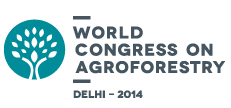Decentralization and forest restoration governance: A comparative study in upland communities of Southwest China
Decentralization and forest restoration governance: A comparative study in upland communities of Southwest China
wca2014-1873 Jun He 1 2,* 1Yunnan Agricultural University, kunming, 2World Agroforestry Centre, Kunming, ChinaThe Chinese government is currently implementing the world’s largest forest restoration program, the Sloping Land Conversion Program (SLCP), which uses public payments to convert marginal cropland in upper watersheds into forests, engaging millions of mountain-dwelling households. Apart from providing financial incentives, the state has also attempted to promote local autonomy and participation in the program. This promotion is a milestone shift in forest policy to grant more power to local communities and increase the involvement of local governance in decision-making. However, whether the SLCP has been effectively implemented, the extent of its ecological and socioeconomic outcomes and how its performance can be improved are still unclear in the absence of adequate biophysical and socioeconomic data. To gain a holistic understanding of the SLCP’s implementation and impacts, this research examines the interplay between the governance of the policy implementation and local variations leading to the various ecological and socioeconomic outcomes observed based on a comparative case study. It provides a novel explanation of why SLCP succeeds in one place but fails in the other, although the program generally implemented in a top-down approach, and it argued the significance of local institutions in shaping the policy’s outcomes. This paper recommends institutional reform across the country’s socio-ecological system with the national policy-maker allowing flexibility in policy implementation and developing mechanisms for accountability and local institutions.

